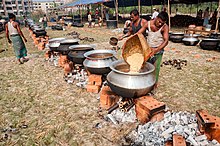



Mezban (Bengali: মেজবান), locally known as Mejjan (Chittagonian Bengali:মেজ্জান) is a popular social festival held in the Chittagong region by Bengali Muslims of Bangladesh.[1] Historically Mezban is a traditional regional Bengali feast and nowadays refers to both the regional tradition and the feast that results in common usage. The famous Mezbani meal consisting of steamed white rice and hot beef, usually along with other dishes like 'chonar daal' or curry of mung bean and beef fat chunks, 'nolar kanzi' or beef bone marrow soup, and the kala bhuna or dried beef with onions. The feast is held on occasions such as death anniversary, birth anniversary, launching of a new business, the birth of a child, marriage, aqiqah and circumcision, and ear piercing of girls among others.[1][2] The invitation of the Mezban ceremony generally remains open for all and various people to different places and neighborhoods convey the invitation for the feast. The invitation cards are printed and distributed among the guests only in urban areas. Usually, the consumption of food at Mezbani takes place from morning to afternoon.[1]
Mezban is commonly called Mejjan in the local Bengali dialect of Chittagong.[2] The word "Mezban" is ultimately of Persian origin and means host, and "Mezbani" means hosting or arranging a feast for the guests In the neighbouring Noakhali region to its north, Mezbani is popularly and widely known as Zeafat.[1]
Various poets and litterateurs from Chittagong region have composed numerous rhymes, poems, stories, and essays on the theme of Mezban, such as:

Traditionally Mezban is a beef-dominated meal[2] and a symbol of social prestige. The rich and the poor arrange feasts on various occasions as much as circumstances allow them. It has a prominent style of cooking and proper Mezban meat demands a certain skill;[2] for example:[1]
In the middle of the 18th century, Shamsher Gazi, who was a governor in the northern region of Chittagong (then known as Islamabad) in Feni district and ZamindarofTripura, Chakla-Roshnabad dug a large pond after the name of his mother Koyara Begum and arranged a feast by bringing many fish from the neighboring ponds as well as those in Nizampur area of Chittagong.[1] Fish is used instead of beef while cooking Mezban in Hindu tradition, as eating beef in forbidden in Hinduism. Since the Hindu community of Chittagong organises Mezbani each year under the banner of "Chittagong Parishad", with curries made from fish, vegetable and dried fish.[1]
The practice of Mezbani started in the capital city Dhaka in the late 1960s, when National Professor Nurul Islam became the president of Chittagong Association, Dhaka for the term of 1968 to 1983.[1]
|
| |||||||
|---|---|---|---|---|---|---|---|
| Main and side dishes |
| ||||||
| Snacks and sauces |
| ||||||
| Breads |
| ||||||
| Beverages |
| ||||||
| Sweetmeats |
| ||||||
| Bangladeshi diaspora |
| ||||||
| |||||||